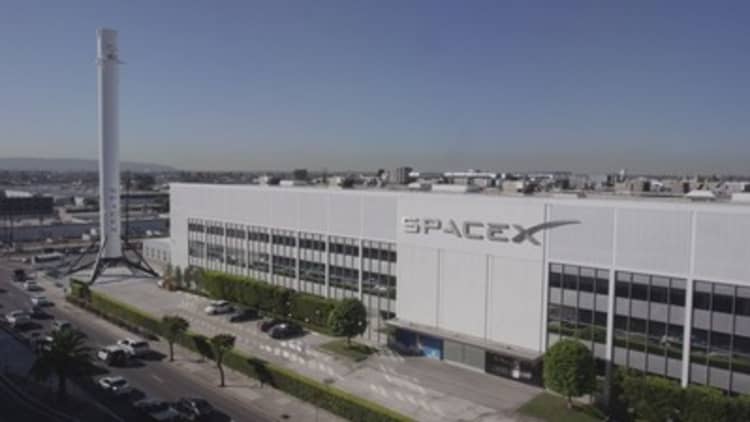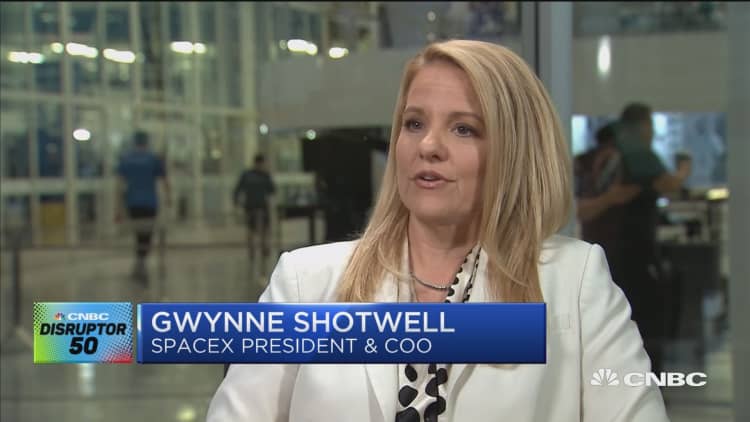
Elon Musk's distaste for the public stock market may be pushing him to take Tesla private, but the chief executive's surprise moves this week have not alarmed SpaceX investors.
Three current investors in SpaceX spoke to CNBC on condition of anonymity. They said they are along for the ride, emphasizing the chance to be part of something revolutionary rather than just buying a stake for financial gain.
"I can't speak for everyone, but for the group of individual investors I know ... [they] are not invested first and foremost for financial upside, they've invested for the chance to play a small part in one of the very few private companies that will likely change the course of history," one investor said. Investing in a Musk company is akin to being an early backer of iconic inventors from the turn of the 20th century, this investor said, such as Thomas Edison or Alexander Graham Bell.
SpaceX, a space transportation services company founded by Musk in 2002, has become one of the most valuable private companies in the world, valued at an estimated $28 billion. The expectation has been that at some point, it will list shares on the stock market, allowing private investors a chance to cash out and others a chance to buy in. But any initial public offering is likely well in the future.
Musk's vision for SpaceX is to push humanity to become a species living on multiple planets. That vision is "big, bold and long-term," a second investor said.
"He needs to stay private with SpaceX so he can achieve this," the second investor said. "I think everybody who's put money in it understands that there's not a chance of an IPO until they make it to Mars."
SpaceX President and COO Gwynne Shotwell told CNBC in May that the company "can't go public until we're flying regularly to Mars."
"One way or another, it's not until then, at a minimum," she said.
But Musk's frustration with public markets bubbled over this week. He told Tesla employees and the world on Tuesday that he wants to take his electric car maker private, citing the volatility of the quarterly earnings cycle and being the target of traders who have bet against the company.
Even as Musk's take-private plan for Tesla raises questions about the possibility of a SpaceX public offering, investors who talked to CNBC said they remain confident that an IPO will happen — even if it's a long way off. The thought that SpaceX might never do an IPO "never even crossed my mind," the second investor said.
"I am confident that if Elon decides to go for an IPO for SpaceX, bankers will line up to syndicate the deal and the IPO will be oversubscribed," the third investor said.
The need for money from an IPO isn't immediate. SpaceX has steadily raised private funding "as we need it," Shotwell said.

"We're being very picky about who invests in the company," Shotwell said in May. "We want investors with patience as well as excitement about what we're trying to do."
Among that tight group, the second investor says they "have not heard of anyone getting cold feet" due to Musk's unprecedented actions this year.
SpaceX's unique funding structure
The rocket company keeps its private investors happy by offering an "interval liquidity program," Sohail Prasad, co-CEO of private market analysis group Equidate, told CNBC. That is to say, it vents some steam every once in a while by letting investors buy and sell shares.
"Two to three times a year SpaceX shareholders can get liquidity, on a planned, forecast basis," Prasad said.
Through Fidelity Investments, SpaceX set up a program several years ago to enable investors to buy and sell shares at certain times, according to Prasad. SpaceX has a heavy say in the negotiating process, dictating both the investors the company brings in and the price at which they buy shares.
"They're also controlling the price at which their secondaries are trading," Prasad said. "They knew they wanted SpaceX to remain a private company for a long time."
A stake in SpaceX — both as a piece of history and for its potentially lucrative IPO when it does happen — is desired by all types of investors, according to Equidate: Wealthy individuals and families, hedge funds, sovereign wealth funds and private equity. "You have a company that a lot of people globally want to invest in, and you've created a very competitive process. That leaves a lot of flexibility to come in and set terms," Prasad said.
An IPO can wait
Going public is becoming less necessary for companies to raise significant funding, according to Prasad.
SpaceX is an example of how the venture capital industry, as well as the private market, continues to change, in Prasad's view. Private investors used to jump into companies very early and sell at the earliest opportunity, he says. Instead, as companies stay private longer, and with more access to private capital, companies have the upper hand in choosing what those exits look like.
SpaceX is "like Airbnb and others, where they are able to say 'we are raising capital and this is what is going to look like,'" Prasad said.
The three current shareholders told CNBC they remain confident Musk will take SpaceX public at some point. But a former shareholder, who also spoke to CNBC on condition of anonymity, expressed doubt over Musk's willingness to test the public markets' waters again. (The former investor disclosed that the main impetus for selling their shares several years ago was getting money out.)
"He's always made the moves to take it public but called the Tesla shareholders 'millions of little tyrants' who would never let him go to Mars if SpaceX were public," the former investor said.
Musk may be at loggerheads with Wall Street now, but these current investors are betting that will fade in the coming years. Just one thing first: Colonize Mars.


